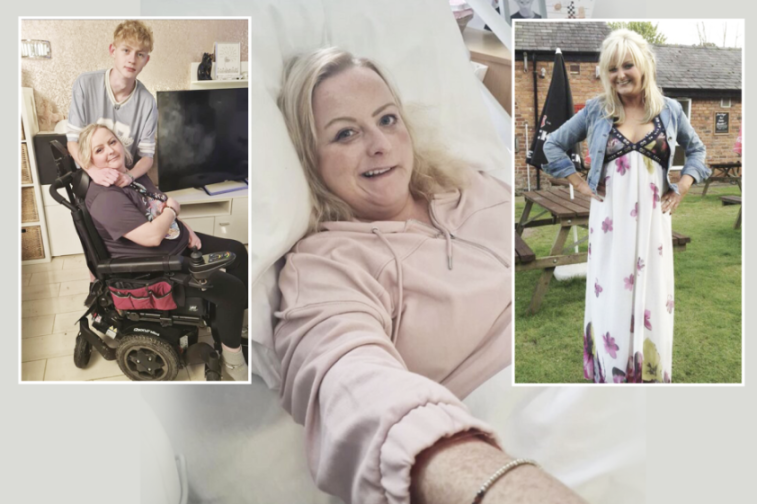WHEN Olivia Bettney, 20, missed a birthday call to her mum Susan Burfoot, her family thought she was simply worn out after a festival.
But after calling University of Wales Trinity Saint David’s on August 13 to check on her, they were heartbroken to discover she’d died in her sleep .
 Olivia Bettney (right) was found dead on August 13
Olivia Bettney (right) was found dead on August 13
 Her mum (right) was concerned when her ‘family-oriented’ daughter hadn’t wished her ‘happy birthday’ at midnight as usual
Her mum (right) was concerned when her ‘family-oriented’ daughter hadn’t wished her ‘happy birthday’ at midnight as usual
 The family were heartbroken to discover she’d died in her sleep
The family were heartbroken to discover she’d died in her sleep
“We arrived outside the residence and we just sat outside and waited until they brought her tiny little body out,” Susan, a 64-year-old teaching assistant, said.
While her cause of death is not confirmed, it’s believed it could be linked to her type 1 diabetes , which caused her to go blind last year.
“It was just a normal day as we were concerned,” said Susan, from Swansea, recalling the night her daughter died just hours before her 64th birthday celebrations
“Olivia would normally text me around midnight to say ‘happy birthday’ or ring me and that didn’t happen.”
“She’d been to a festival and she’d had a good time and I knew she got home safe so I thought ‘she’s probably knackered'”.
But Olivia was “so family-oriented” – which made her mum suspect something serious was up when the birthday call never came.
Training specialist Mollie Holborow, Susan’s other daughter and Olivia’s older sister, decided to call the University to check in on her.
“One or two police officers came to the door [later] and explained what had happened,” Susan said.
“I just looked at them and said ‘this is a joke’. I couldn’t stop shaking and was in denial, we’re looking for answers now as to why.”
According to Susan, Olivia was “just perfect and so humble and kind.
“My biggest love with Olivia is that she’s a Taylor Swift fan. We wore thirteen on our hands because that’s what Taylor does.
“She was always proud of the fact my birthday was on the 13th and it’s Taylor’s number but that’s not my birthday anymore [after this].”
She added: “She wanted to counsel children and young people with bereavement [after her dad died when she was seven] and wanted to open her own practice and wanted to go into schools.”
Mollie said they are waiting to discover the cause of death and are currently planning Olivia’s funeral.
She has since set up a GoFundMe to help cover funeral costs, said: “It’s a devastating loss for our entire family.
“[Olivia has] left behind my three children,” Mollie said.
 While her cause of death is not confirmed it’s believed it could be linked to her type 1 diabetes which caused her to go blind last year
While her cause of death is not confirmed it’s believed it could be linked to her type 1 diabetes which caused her to go blind last year
 Mollie (right, at her wedding with her sister, left, and their mother, centre) has now created a GoFundMe page to raise money to pay for her sister’s funeral costs
Mollie (right, at her wedding with her sister, left, and their mother, centre) has now created a GoFundMe page to raise money to pay for her sister’s funeral costs
 Her heartbroken mum, (right), shared her daughter’s love for Taylor Swift
Her heartbroken mum, (right), shared her daughter’s love for Taylor Swift
“Nobody expects to go and find their sister or daughter passed away in their student accommodation.
“We don’t know [her cause of death] but we think that it’s likely it was due to her diabetes.
“I’ve been in a place where I wanted to sleep and wake up when it’s all over.
“Since I posted [the GoFundMe page] last night and all the love started flooding in and seeing the generosity made me want to get up in the morning for the first time since this happened.
“It made me feel a little bit of happiness.”
‘The only solace we have at the moment is that she’s with her dad’
Olivia’s bright blue hair was her trademark, but when sister Mollie got married, she asked her to dye it brown.
“She was her own person and she said ‘no, that’s not me’. I’m so glad she did now.”
Susan hopes the GoFundMe page will help to give her daughter “the best possible send off” as well as bring their community together.
Susan said: “The only solace we have at the moment is that she’s with her dad. It’s a comfort.
“Just to know people are thinking of her and we can see positive things.
“It’s not the monetary value, it’s about letting them know how much she meant to us.”
A spokesperson for University of Wales Trinity Saint David’s said: “The University is saddened to hear of the death of one of our students.
“We extend our deepest sympathy and condolences to her family and friends.”
South Wales Police have been contacted for comment.
 The teaching assistant from Gorseinon, Swansea, Wales, said: ‘I don’t know that my heart will ever recover’
The teaching assistant from Gorseinon, Swansea, Wales, said: ‘I don’t know that my heart will ever recover’
 ‘It’s a devastating loss for our entire family,’ Mollie (right) says
‘It’s a devastating loss for our entire family,’ Mollie (right) says Type 1 vs type 2 diabetes
There are two main types of diabetes, which causes a person’s blood sugar level to become too high.
Type 1 diabetes is a lifelong condition where the body’s immune system attacks and destroys the cells that produce the hormone insulin.
It affects around 344,000 people in the UK.
Type 2 diabetes on the other hand is far more common, accounting for more than 90 per cent of the 4.4million adults with diabetes.
It occurs when the body doesn’t produce enough insulin, or the body’s cells don’t react to it properly.
There are no lifestyle changes you can make to lower your risk of type 1 diabetes.
But you may be at higher risk of type 2 diabetes if you are overweight or obese, eat unhealthily, have a family history of the condition, take certain medications for a long time, have high blood pressure, and have had gestational diabetes during pregnancy.
People of Asian, Black African or African Caribbean origin are also at increased risk.
Source: NHS and Diabetes UK







